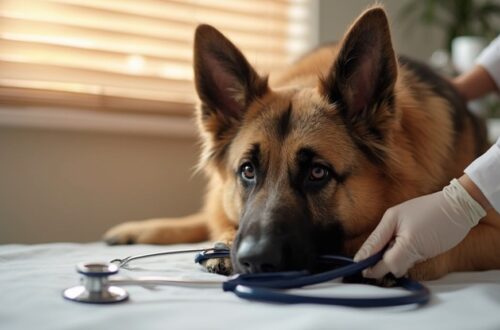
Grieving a Pet: Coping With Dog Loss
When you lose a dog, you're facing one of life's deepest emotional challenges. Your grief is completely natural – these faithful companions become cherished family members who share our daily routines, joys, and sorrows. You'll likely experience waves of sadness, difficulty concentrating, and even physical symptoms like changes in sleep or appetite. It's important to honor your pet's memory in ways meaningful to you, whether through creating a memorial, joining support groups, or sharing memories with others who understand. The journey through pet loss grief is unique to each person, but you don't have to navigate it alone.
Understanding Pet Loss Grief
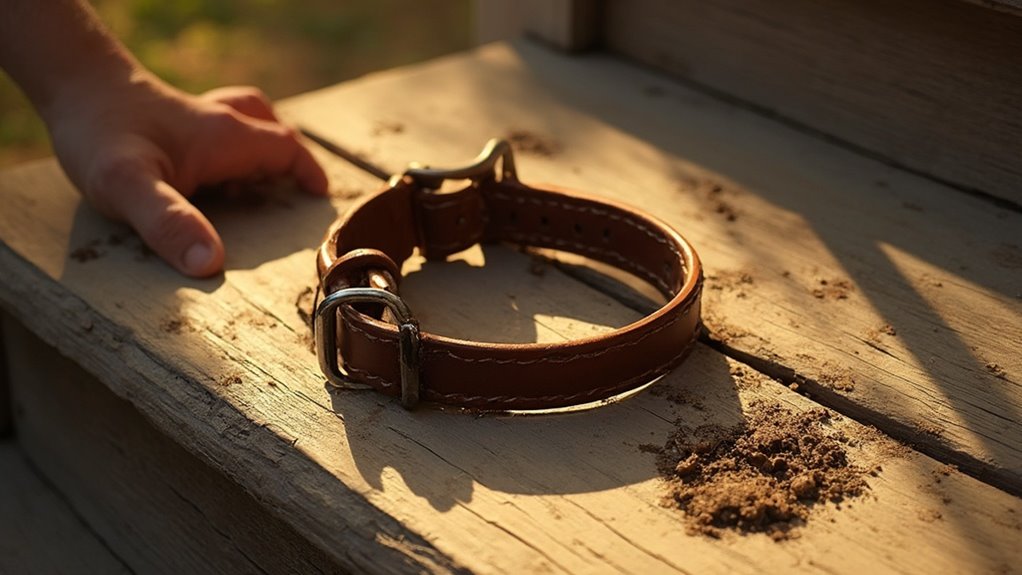
The empty leash hanging by the door serves as a stark reminder that losing a pet dog is more than just saying goodbye to an animal – it's losing a cherished family member. You're navigating through a profound loss that affects every aspect of your daily routine, from morning walks to evening cuddles.
Understanding your grief means recognizing that emotional processing takes different forms for everyone. You might experience waves of sadness that come unexpectedly – during a commercial featuring dogs, finding an old toy under the couch, or passing your pup's favorite park. These moments aren't signs of weakness; they're natural responses to a deep bond that's been severed.
When you're dealing with sadness after losing your dog, you'll likely encounter people who don't fully grasp the depth of your loss. Remember that your grief is valid, and there's no standardized timeline for healing. Your dog was unique, and so is your journey through grief. The routines you shared, the silent understanding you developed, and the unconditional love you exchanged created a connection that deserves to be honored through your grieving process.
Common Emotional Reactions
When faced with pet loss, you'll experience a range of powerful emotions that might feel overwhelming or unexpected. These reactions are natural responses to losing a beloved companion and can manifest in various ways, from intense sadness to unexpected anger.
You might find yourself feeling overwhelmed by waves of grief that come and go without warning. It's common to experience difficulty concentrating at work or during daily tasks, as your mind processes the loss.
Some days, you may feel guilty about times you were too busy for walks or play sessions, while other days bring anger at the circumstances of your dog's passing.
Many people report experiencing physical symptoms like fatigue, changes in appetite, or sleep disturbances. You might catch yourself listening for familiar sounds – the clicking of nails on the floor or the jingling of collar tags. These phantom sensations are typical grief responses.
Some days, you'll find yourself laughing at cherished memories, while others bring profound sadness. Each emotional reaction represents your unique bond with your dog and the depth of your loss.
Creating a Memorial
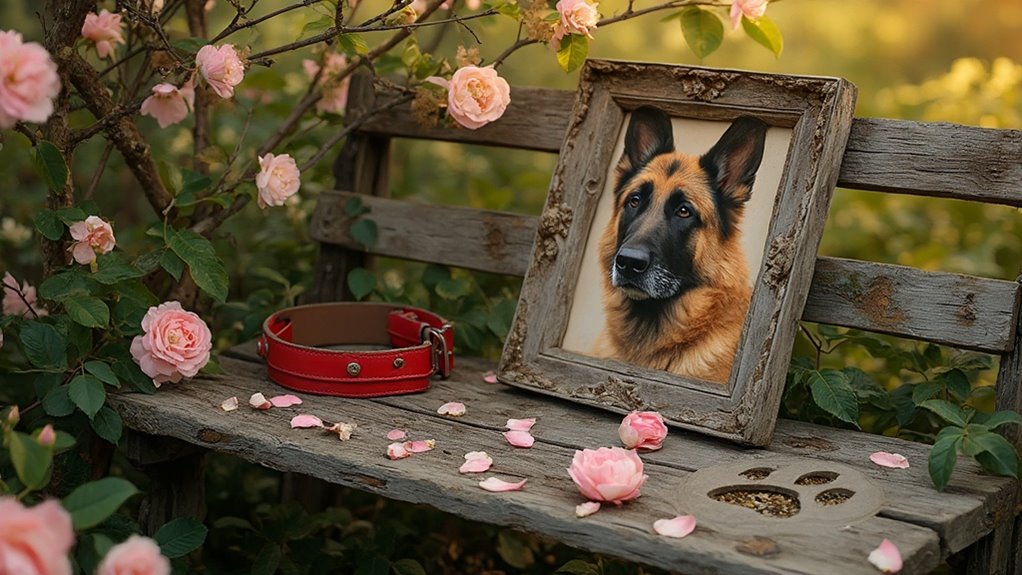
Creating meaningful memorials can help channel your grief into a lasting tribute for your beloved dog. When planning funeral service arrangements, consider both traditional and innovative ways to honor your companion's memory. You might opt for a private backyard ceremony, complete with readings and shared memories, or collaborate with a pet memorial service that specializes in dignified celebrations of life.
Creating personalized tribute pieces offers countless possibilities to preserve your dog's memory. Transform their collar tags into jewelry, commission a portrait from their favorite photo, or design a memory garden with their favorite toys and dedicated plantings. Consider crafting a shadow box featuring their cherished items, paw prints, and photographs. Digital memorials, such as professionally edited video montages or dedicated social media pages, can help you share your dog's story with others who understand your loss.
If you're tech-savvy, you might develop a memorial website or create a digital scrapbook using apps that combine photos, videos, and written memories. Whatever method you choose, focus on creating something that authentically captures your unique bond and brings you comfort during the grieving process.
Finding Support Groups
During difficult times of pet loss, support groups provide invaluable comfort and understanding from others who share similar experiences. You'll discover that connecting with people who truly understand your grief can help validate your feelings and provide practical coping strategies. Many veterinary clinics and animal shelters maintain lists of local pet loss support groups where you can meet face-to-face with others who've lost their beloved companions.
If you prefer more flexibility or anonymity, online forums dedicated to pet grief offer 24/7 support from a global community. These digital platforms let you share memories, seek advice, or simply read others' stories when you need reassurance that you're not alone. Some popular options include Reddit's pet loss communities and Facebook groups focused on dog grief support.
For more structured assistance, consider pet-specific grief counseling services. Many mental health professionals now specialize in helping people process animal loss, offering both individual and group sessions. You can find these specialized counselors through veterinary referrals or pet bereavement organizations that maintain directories of certified professionals in your area.
Helping Children Through Loss
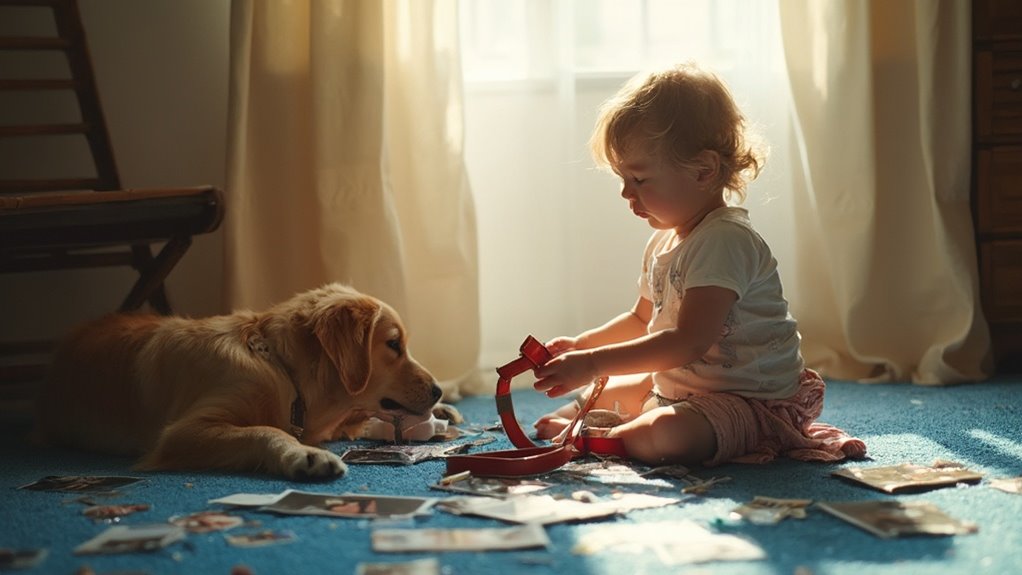
How do you explain to a child that their beloved furry friend won't be coming home? Children process grief differently than adults, and they need special guidance to navigate this emotional journey. You'll want to be honest but gentle, using age-appropriate language that they can understand.
Create a safe space for sharing feelings by listening without judgment and validating their emotions. Let them know it's okay to cry, feel angry, or even laugh when remembering happy moments with their dog. Encourage them to express themselves through drawing, writing stories, or creating a memory box filled with their pet's favorite toys and photos.
Watch for signs that your child might be struggling, such as changes in sleep patterns or withdrawal from activities. Some children benefit from talking about emotions with other kids who've experienced similar losses. Consider connecting them with children's pet loss support programs at local veterinary clinics or animal shelters.
Help them honor their dog's memory through meaningful activities like planting a memorial garden, making a photo album, or donating to an animal shelter in their pet's name. These actions can provide comfort while teaching healthy ways to cope with loss.
Taking Care of Yourself
When you're grieving a pet, self-care often takes a backseat to overwhelming emotions. During this challenging time, it's crucial to establish a foundation of self-care routines that support your healing process. Start by acknowledging that your grief is valid and deserves attention.
Create a daily structure that includes basic self-care activities like regular meals, adequate sleep, and gentle exercise. Setting self care routines helps maintain stability when emotions feel chaotic.
Try practicing mindfulness through simple activities like deep breathing exercises or short meditation sessions to stay grounded in the present moment.
Don't hesitate to reach out to fellow pet owners who understand your loss. Join online support groups or connect with friends who've experienced similar grief. Consider channeling your emotions into creative outlets like journaling, art, or creating a memory book of your beloved companion.
Remember that healing isn't linear. Some days will feel harder than others, and that's normal. Listen to your body's needs and adjust your self-care practices accordingly. If you find yourself struggling to cope, seeking professional support from a grief counselor can provide additional tools for navigating your loss.
When to Get Another Dog
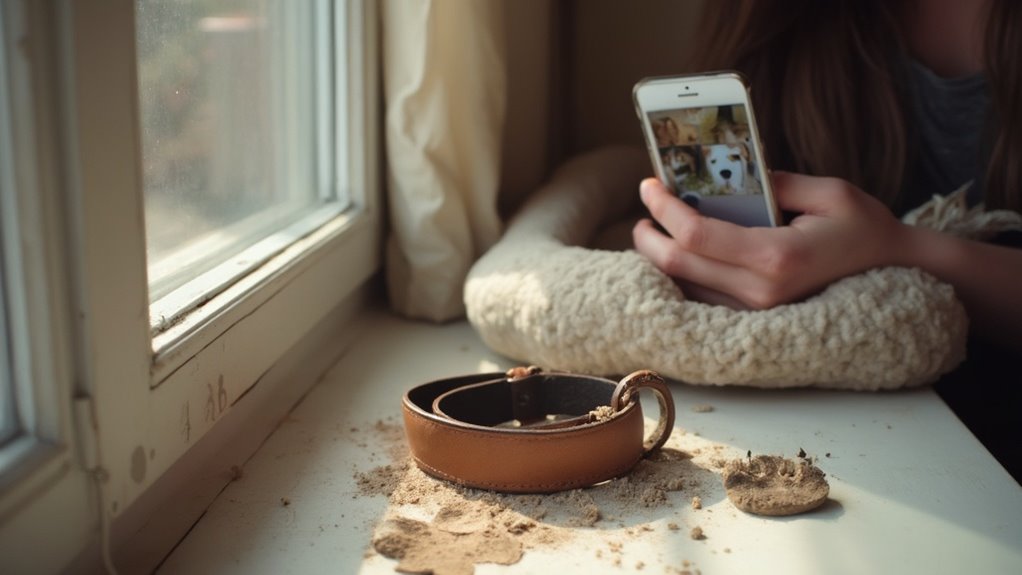
The decision to bring another dog into your life can weigh heavily after losing a beloved pet. There's no universal timeline for finding the right timing – some people need months or years to heal, while others find comfort in welcoming a new companion sooner. Trust your instincts and don't let others pressure you into making the adoption decision before you're ready.
You'll know you're prepared when you can think about your departed pet with more smiles than tears, and when you're able to love a new dog for its own unique personality rather than seeking a replacement. Consider whether you have the emotional energy to bond with and train a new pet, and if your lifestyle can accommodate a dog's needs right now.
When you do feel ready, take time to thoughtfully evaluate different breeds, ages, and temperaments. Remember that your new companion won't replace your previous dog but will create its own special place in your heart. The goal isn't to fill a void but to open your heart to a new relationship when the timing feels right for you.
Preserving Happy Memories
Cherished memories of your beloved dog deserve to be preserved and celebrated as part of your healing journey. Creating photo albums dedicated to your pet allows you to curate special moments, from playful adventures to quiet cuddles. Consider organizing these images chronologically or by themes like holidays, favorite activities, or milestone events.
Making memory boxes offers another powerful way to honor your companion's legacy. Gather meaningful items like their favorite toy, collar, or paw print impressions. Include handwritten notes about funny stories, personality quirks, or the daily routines you shared. You might add their adoption papers, vet records, or special occasion cards that feature their name.
Transform these memories into creative projects that keep their spirit alive. Design a custom photo book with captions describing each captured moment. Create a digital memorial video set to music, or commission an artist to paint their portrait. Consider starting a blog or journal to document your favorite memories and the lessons they taught you. These tangible reminders help process grief while ensuring your dog's impact on your life remains forever preserved.
Dealing With Guilty Feelings

Many pet owners struggle with overwhelming guilt after losing their dog, questioning every decision and wondering if they could have done more. Whether it's doubts about medical choices, not spending enough time together, or the difficult decision of euthanasia, these feelings can become all-consuming and interfere with the natural grieving process.
It's crucial to practice self forgiveness and understand that you made the best decisions possible with the information you'd at the time. You're not alone in second-guessing your choices – it's a common response to loss. Try redirecting guilty thoughts by focusing on the quality of life you provided for your pet throughout your time together.
Managing expectations during this emotional period is essential. You won't overcome these feelings overnight, and that's okay. Consider writing down your concerns and discussing them with other pet owners who've experienced similar losses. If guilt continues to dominate your thoughts, don't hesitate to seek support from a pet loss counselor who can help you process these complex emotions and move toward acceptance without dismissing the significance of your relationship with your dog.
Conclusion
You'll find that grieving your beloved dog takes time and patience. While there's no set timeline for healing, remember that it's perfectly normal to deeply feel this loss. Honor your pet's memory, lean on support systems, and be gentle with yourself during this process. When you're ready, consider new ways to share your love – whether that's volunteering, memorializing, or welcoming another pet into your life.


